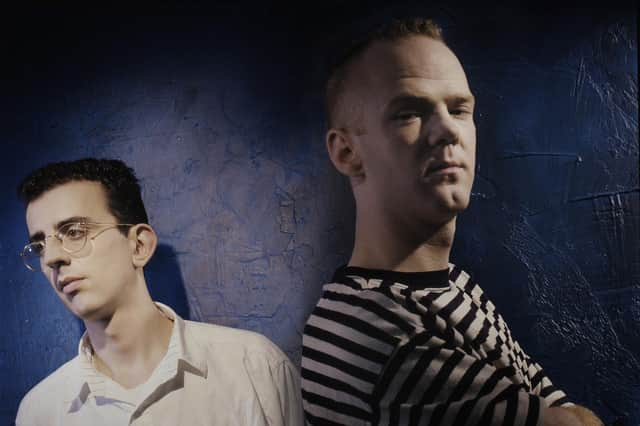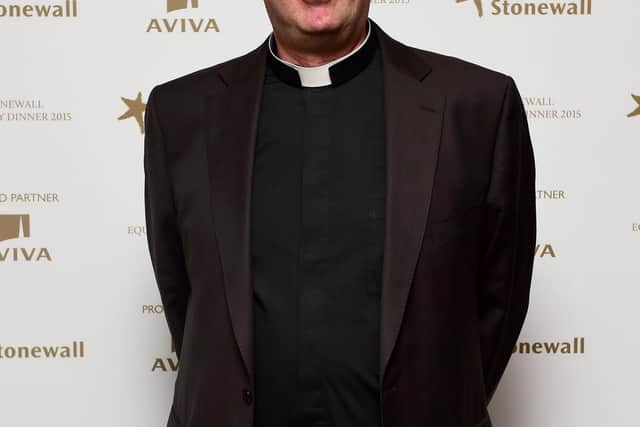Rev Richard Coles: 'I think everyone should be a pop star at some point in their lives'


As the album is reissued on vinyl this week, Coles, now aged 60 and a celebrated broadcaster, novelist and clergyman, cannot help but see parallels from that era with the politics of today. “I don’t really feel much nostalgia for the 80s,” he says. “I think if anything, our present-day circumstances seem to be almost a revival of the 80s in some way.”
For him and Somerville, who had previously been the singer in Bronski Beat, to be tackling homophobia head-on “felt like a non-negotiable” at the time, he says. “We’d always been absolutely upfront and clear about who we were, so we never had a sort of strategic discussion about that. It was simply unthinkable that we would have done it any other way.”
Advertisement
Hide AdAdvertisement
Hide AdAlthough their band would not see out the decade, considerable social change was afoot – thanks to the gay rights movement, in which The Communards had played a part.
“I was looking at the Index on Social Attitudes,” Coles says. “In 1980, 80 per cent of people thought gay relationships were always wrong; that had shifted to 20 per cent by 1990. In 10 years an awful lot happened, so for us it felt like a big vindication, really, because I think we were part of something that did genuinely change the landscape.”
Back in 1987, Aids was regarded as a death sentence – something that the band addressed directly in the song Victims. Coles says it was “tricky” to articulate the fear that many gay men felt at the time “because we were so devastated by the impact of Aids because it affected us so directly”.
“I don’t think we even really knew what we were doing, but we had to respond in some way,” he says. “But of course it takes years to really digest something like that. It’s only now that you can see that there’s a way you can think about that and reflect on it, that you couldn’t do at the time. Then we were just trying to get through it day by day. I think the rawness of it comes through. It was a weird thing, being in your 20s having to cope with the reality of mortality, which normally doesn’t come until you’re quite a lot further on in life.”
Advertisement
Hide AdAdvertisement
Hide AdThe song For a Friend was written for Mark Ashton, the gay rights activist and co-founder of the Lesbians and Gays Support the Miners, who tragically died in February 1987 aged just 26. Coles says he first met Ashton, who would later be commemorated in the film Pride, when he moved to London from Northamptonshire, where he had grown up. “He was part of our little gang running around King’s Cross and he was a fantastic person,” he recalls. “He was a quite inspiring and brilliant activist but he was also really good fun. There was nothing mercurius about him, he was just a delightful, life-enhancing person and so whatever we did we involved Mark.


“He was a great mobiliser. The LGSM was a credit to him – this extraordinary story about a bunch of London-based lesbian and gay people getting on a minibus and going to a miner’s welfare thing in South Wales and forming these relationships which are still enduring. He had the capacity to bring out the best in people and his loss was so terrible; I still feel it now. I wonder what he would’ve become, he had so much to give.”
Ashton, like The Communards, was involved in Red Wedge, a collective of musicians, artists and activists who sought to encourage young people to support the Labour Party. Coles chuckles at the thought that such a collective could exist now. “I think artists and musicians now are more likely to mobilise around single issues,” he says. “I could see XR (Extinction Rebellion) doing it or anything addressing the climate emergency, or people working perhaps on poverty and homelessness.
“But it seems extraordinary now the idea of enlisting a load of pop stars to try to whip people in to a political party, but it made sense at the time.”
Advertisement
Hide AdAdvertisement
Hide AdAs the political commentator Owen Jones points out in an essay to accompany the reissue of Red, The Communards made some surprising allies at the time including the then Tory Health Secretary Norman Fowler and Princess Diana.
Coles says: “Aids went off like a bomb and it blew the world up; when everything settled you did find yourself in surprising company. With Norman Fowler, I’ve got the greatest respect for him because he was the first senior politician to really get it, I think. Further testament to him, his whole political career in the Commons and later the Lords and even now, he’s extraordinarily energetic and dedicated to the whole issues around HIV, which is great. I wanted all Tories to be conveniently evil, I didn’t want Tories being inconveniently good. It made me think about my own thinking, and that’s always a good thing.
“Diana was the person who very much changed public perception (towards Aids) in a very critical way, and lots of us have much to thank her for.”
Coles and Somerville first met “long before” the keyboardist did some session work for Bronski Beat. “Again, we were part of this little gang, we were basically all runaways who came to London in 1980 when we were 18,” he recalls. “We actually met in Gay’s The Word bookshop which is still there; it was the first gay bookshop in Britain, I think. There was a coffee shop at the back and I remember that’s where I first met Jimmy, and we became really close friends really quickly – God knows why because we had virtually nothing in common, that was part of the interest and appeal of each other.”
Advertisement
Hide AdAdvertisement
Hide AdColes later jokingly suggested the idea behind The Communards was to “bring down Margaret Thatcher by doing covers of 70s disco classics”. Political discussion was always at the fore of the band, he says. “Jimmy has always been absolutely tireless as an activist and extraordinarily energetic and single-minded; I was much more theoretical. It was always a thing about Jimmy being a sort of street boy and me being a posh boy, and that was kind of true, really. We brought different things to our joint enterprise, but we were absolutely single-minded and we still are. My political thinking and experience has shifted an awful lot over the years, but I’ve never shifted around that much.”
With Somerville already having had a string of hits such as Smalltown Boy with Bronski Beat, The Communards quickly hit the ground running. Their first two singles were top 40 hits, then came their cover of Don’t Leave Me This Way with Sarah-Jane Morris, which reached No1 and was the UK’s best-selling single of 1986. Coles says he was “delighted” to be in the public eye, explaining: “I’d always nursed an ambition to be famous in a ridiculous sort of way. Then when it came along I had problems with being nowhere near as famous as the person I stood next to, which was a bit a bit complicated.”
Nevertheless he says he “really enjoyed” his short-lived pop career. “I liked the attention and I liked the reward, and I guess I liked the opportunity to bang our drum and to get people involved and engaged. I think everyone should be a pop star at some point in their lives.”
The Communards went into hiatus a year after Red came out. Coles quips: “We didn’t actually split up, we decided to have a break and are still having it. It’s the longest break in the history of pop music.” However, he admits: “Jimmy and I, our relationship had stalled a bit, as happens often with people in bands. Also I think we’d run out of stuff that we wanted to do, so we decided to have this break, and as I said, we’re still on it.”
Advertisement
Hide AdAdvertisement
Hide AdAfter a short spell in journalism, Coles found Christian faith. He remembers the moment of realisation came the first time he went to church “with the big possibility of engagement in my mind”. “Once I did that, it immediately made sense to me,” he says, “but it had been coming on for years, when I think about it now. I was a chorister when I was a kid and I loved it even though I never believed any of it at all.
“When I came to end of my 20s believing it just sort of happened, really. It just came to me like a bolt out of the blue.”
After studying for the priesthood at the College of the Resurrection in Mirfield, and undertaking a Master’s degree at the University of Leeds, he was ordained into the Anglican church in 2005, serving as a parish priest for 17 years. The “loveliest thing” about being a vicar, he says, was becoming “woven into the lives of other people”. He says he found that profoundly fulfilling. “I loved that about being a vicar and I miss it very much. Where I am now I have to remember that I’m not the vicar because I’m sort of habituated to siding up to strangers; I can’t really do that now.
“Of course those relationships continue but it’s not the same if you’re not the vicar because you don’t have that booked slot in people’s lives when somebody dies or somebody gets married or somebody gets baptised or going into school and meeting the kids and seeing them grow up and become adults. Some of the kids I knew when they were at primary school and are later married. I miss that.”
Advertisement
Hide AdAdvertisement
Hide AdIt was the death of Coles’ long-term partner David in 2019 that made him contemplate retiring from being a vicar. “After a devastating bereavement, there is a period after where you take stock, and I wanted to be somewhere else because I thought I need to face forward and think about what’s left of my life, and I wanted to that on my own anew,” he says. “I think there’s sort of a discipline about being a vicar in the Church of England and I began to think I could do things or write more freely as a retired vicar than I could as a vicar in post.”
Since retiring to East Sussex in May this year, he has found broadcasting and novel-writing has filled a certain gap once filled by parish ministry. His first novel, Murder Before Evensong, was a No1 Sunday Times bestseller. “I’ve always been a writer and writers write, it’s just something I do and I wanted to do more of it,” he says. “Also I got fed up with being away from home all the time. I like sitting at home and writing and pottering around and doing the things that retired vicars do.”
Coles reveals he has already finished his second novel and is on the third one. “I’d like to keep going with Canon Clement mysteries as long as people want to read them,” he says. “I’m enjoying writing them very much.”
Red is out on Friday October 28.
